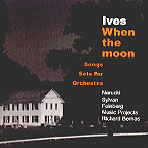As if we need any more evidence of Charles Ives’ unconventional ideas and composing techniques, this excellent recording reminds us that for him, a song was less a form and more a wide-open vehicle for free expression–whether spontaneous, undeveloped personal thoughts or settings of the most refined poetic utterances. But no matter how you analyze or try to define Ives’ motives and methods, you have to be impressed by his way with a text–from his own (The See’r; The New River; Remembrance) to those of revered writers such as Lord Byron (who wrote the poem from which the disc’s title is taken), John Keats, Rudyard Kipling, John Milton, William Wordsworth, or Robert Underwood Johnson. As conductor Richard Bernas explains, “Ives’ songs are an essential key to his musical imagination, not just in vocal but in the most extravagant instrumental terms, when they are transformed into the Sets for Orchestra.” And therein lies the genius of this recording: to place the songs alongside the orchestral versions that often preceded them. Many listeners will not be aware that Ives wrote a number of instrumental works that he later set to texts; he also turned original songs into instrumental pieces. Both types are represented here and it’s fascinating to compare the related compositions that also stand perfectly well on their own.
The orchestral sets are expertly performed by Bernas and his Music Projects/London ensemble, and likewise, the vocal versions are given high-class attention by soprano Susan Narucki and baritone Sanford Sylvan, with Alan Feinberg at the piano. We can only marvel at (and reach for the repeat button following) a masterpiece such as the song The Last Reader, an Oliver Wendell Holmes text set with uncommon sensitivity and evocative piano colors and shadings. And what can you say about Charlie Rutlage, a two and one half minute dramatic tour de force about “another good cowpuncher” who’s “gone to meet his fate”–except that it’s perfect, and not a second too long or too short? Similarly, the disc’s final song, a beautiful yet almost painfully brief “remembrance” of the composer’s father (with a text by Ives himself), leaves you wanting more but realizing that in 53 seconds Ives has said all that needs be said. This is a very special and memorable recording that deserves priority not only on listeners’ purchase lists but also among citations for disc of the year–any and every year. The sound is vibrant, detailed, and brightly-colored, suitably intimate for the songs and appropriately full-bodied and spacious for the orchestral pieces.
































